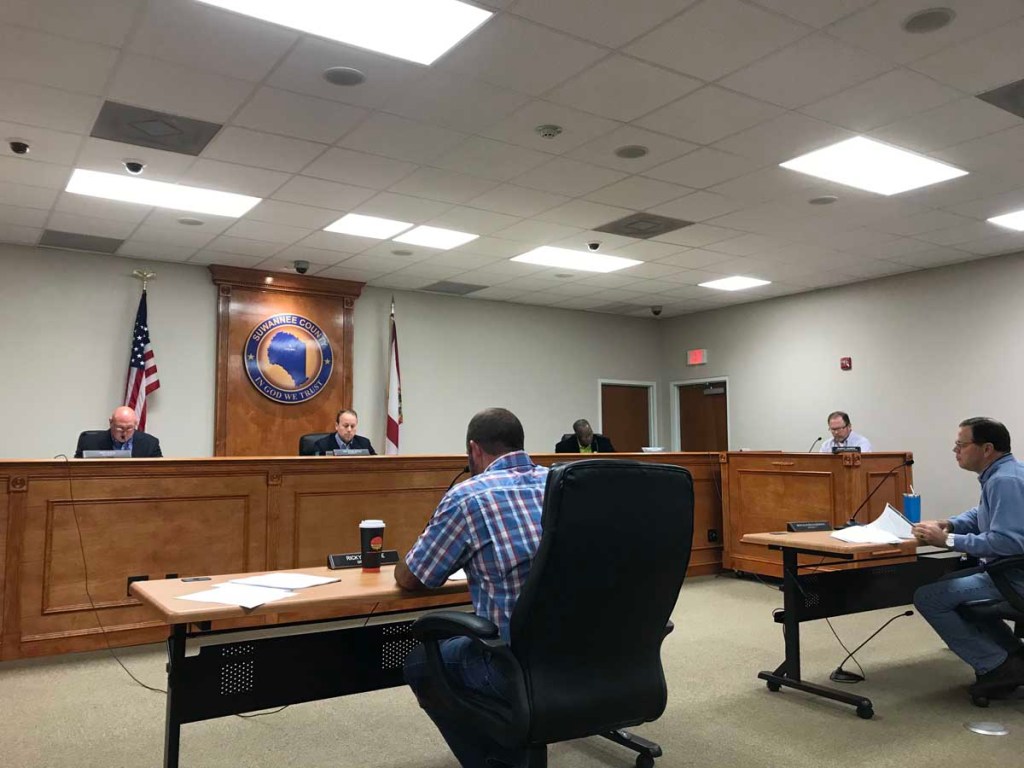Suwannee County officials make non-essential business list
Published 8:01 pm Thursday, April 2, 2020

- The Suwannee County Board of County Commissioners discuss the COVID-19 pandemic at a special called meeting Thursday morning.
LIVE OAK — Facing more questions than answers as to what is and isn’t essential in the wake of Florida’s stay-at-home order, Suwannee County officials are looking to change that.
County Administrator Randy Harris volunteered at the Suwannee County Board of County Commissioners’ special-called meeting Thursday morning to work with Sheriff Sam St. John, Live Oak Police Chief Keith Davis, Suwannee County Division of Emergency Management and Town of Branford officials to come up with a list of businesses that may fall into non-essential as the county battles the COVID-19 Coronavirus pandemic.
“We were all trying to figure out, it doesn’t state in these orders what is not essential,” St. John said at the meeting. “So we had discussions about which one was and which one wasn’t. I guess they’re making county officials here to kind of make a decision about what they want closed. I guess that’s where you have to decide what’s not essential.”
Harris said he had begun discussions with County Attorney Jimmy Prevatt prior to the governor’s order about how other communities had handled stay-at-home orders and determining what businesses were allowed.
“There comes a time where you just have to step up and do what’s right,” he said, adding that some people are bound to get offended if their business falls into being non-essential. “It’s time to be a leader and do what needs to be done to try and prevent the spread of this virus.
“I know some of the measures we take in the midst of a pandemic seem alarmist. But later, we don’t want to look back and say they were inadequate.”
District 1 Commissioner Don Hale agreed that identifying what isn’t essential is necessary, adding that from business owners and store managers he has talked with want guidance on the best practices to put into place to keep both employees and customers safe. The board agreed to let officers from the Suwannee County Sheriff’s Office talk to those managers and offer suggestions or reminders. Likewise, the board asked Harris to devise a checklist for businesses to follow during the pandemic.
Still, those practices aren’t always followed, notably in the checkout lines at retail stores, Harris and several commissioners mentioned.
For example, Harris said, the Tax Collector’s office tried to urge customers waiting in line to pay heed to the six-feet guideline for social distancing. But to no avail.
“The problem she recognized over there where they had people trying to get into the tag office, lining up outside the door like school children,” Harris said. “She’d encourage them to maintain that separation and she said they wouldn’t budge, literally almost touching each other.”
The Tax Collector’s office announced Tuesday that it was closing Wednesday until further notice.
Harris said at the county administration office they took a six-foot stick and painted it neon yellow just to reinforce how big a six-foot gap is.
District 3 Commissioner Ricky Gamble asked those assembling the list to keep in mind the non-essential businesses that can still operate with their doors closed to the public, noting some can fulfill orders over the phone or by internet.
“Nobody wants to see a business shut down and a hardship come on them,” he said. “Because about every business out there will tell you that paycheck every Friday is pretty essential.”
Harris agreed that those types of businesses need to continue.
One measure the board discussed but didn’t take was putting in place a capacity ruling for retail stores as Eddie Hand, the county’s public safety director and fire chief, offered as a possibility and County Attorney Jimmy Prevatt asked for guidance on as well. Prevatt noted Alachua County was using a one person per 1,000 square feet of building as a guideline.
“At the end of the day…it’s basically the honor system, are you going to do what’s right for your community,” Chairman Len Stapleton said about wanting to first allow the businesses to try and police themselves and follow the social distancing guidelines.
“Nobody is going to go out there and hold a gun and put handcuffs on you and take you to jail. We’re asking the people to step up and do the right thing.”
The list of non-essential businesses as determined by the Suwannee County Division of Emergency Management, Suwannee County Board of County Commissioners, Live Oak City Council, Branford Town Council, Suwannee County Sheriff’s Office and Live Oak Police Department.
- Barbershops
- Hair salons
- Waxing salons
- Threading salons
- Nail salons
- Estheticians (beauty shops) and related businesses
- Body-art facilities and tattoo services
- Tanning salons
- Massage-therapy establishments and massage services
- Furniture and home-furnishing stores (except those that sell appliances)
- Clothing, shoe and clothing-accessory stores
- Jewelry, luggage and leather goods stores
- Department stores
- Sporting goods stores (except those that sell guns and ammunition)
- Book and craft stores
- Music stores
- Used or antique merchandise stores
- Thrift and consignment stores
- Consumer good rental stores
- Museums and historical sites
- Bars, lounges, taverns
- Commercial amusement establishments (miniature golf, amusement parks, go-kart tracks, etc.)
- Bingo halls
- Theaters
- Gyms and spas
- Private social clubs
- Residential meeting spaces
- Event centers
- Outdoor plazas and markets (except produce markets)
- Retail stores that do not sell essential household goods
- Florists – deliveries acceptable but no in-shop orders; phone or online only
- Tobacco and vaping shops
- Dog groomers
- Auto washing and detailing establishments
- Bowling alleys





